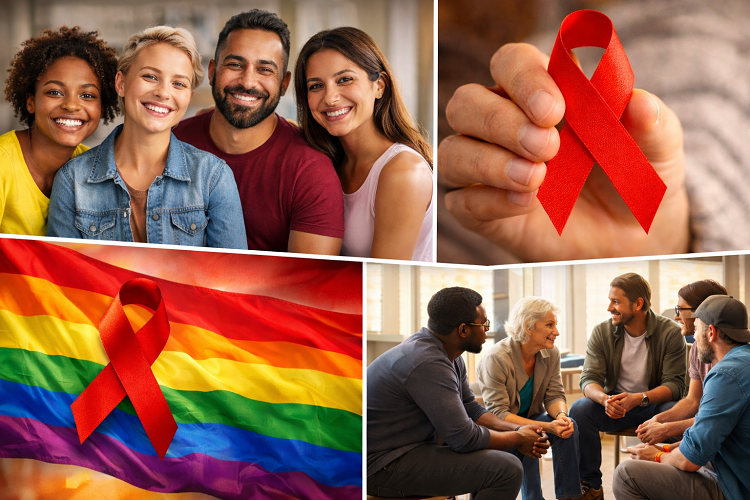Sex and intimacy are essential aspects of a healthy, fulfilling life even when living with HIV. With the right precautions, open communication, and access to treatment, people living with HIV can enjoy Safe And Satisfying Sex without fear of transmission. This guide explores how to build confidence, maintain sexual health, and nurture meaningful relationships while living with HIV.
Understanding HIV and Sexual Health
To have safe and satisfying sex with HIV, it’s important to first understand what HIV is and how it affects the body. HIV (Human Immunodeficiency Virus) attacks the immune system, but with proper treatment — especially antiretroviral therapy (ART) — people can live long, healthy lives. The key to managing HIV is maintaining an undetectable viral load, which means the virus can’t be transmitted sexually.
Knowledge is power when it comes to HIV and intimacy. Learning about viral load, transmission routes, and prevention strategies helps build confidence. Knowing that U=U (Undetectable = Untransmittable) can eliminate fear and stigma, making sexual relationships more comfortable and enjoyable. Educating both yourself and your partner about these facts promotes trust and reduces anxiety around sexual contact.
U=U: The Foundation of Safe Sex with HIV
The concept of U=U (Undetectable = Untransmittable) has transformed how people view sex and relationships with HIV. When someone with HIV takes antiretroviral medication consistently and maintains an undetectable viral load, they cannot pass the virus to their sexual partners. This is backed by extensive scientific evidence and has been a breakthrough in HIV prevention and stigma reduction.
Knowing that U=U allows HIV-positive individuals to embrace intimacy without fear. It restores confidence and promotes equality within relationships. Couples can enjoy physical closeness, sexual pleasure, and emotional connection while maintaining safety. Regular medical checkups and adherence to treatment make this possible, ensuring a fulfilling and risk-free sex life.
The Role of Condoms and Protection
Even though U=U significantly lowers the risk of transmission, condoms remain an essential part of safe sex — especially for protecting against other sexually transmitted infections (STIs). Condoms are a simple, accessible way to safeguard both partners’ health and can be used for vaginal, anal, or oral sex.
Using condoms correctly each time enhances protection. Latex or polyurethane condoms are the best options for HIV prevention. In addition, water- or silicone-based lubricants can prevent breakage and make the experience more pleasurable. For couples where one partner is HIV-negative, combining condoms with treatment adherence (and possibly PrEP for the HIV-negative partner) provides double protection and peace of mind.
Exploring PrEP and PEP for HIV-Negative Partners
For HIV-negative partners, medications like PrEP (Pre-Exposure Prophylaxis) and PEP (Post-Exposure Prophylaxis) offer added layers of protection. PrEP is a daily pill that significantly reduces the risk of acquiring HIV. When taken as prescribed, it’s over 99% effective. PEP, on the other hand, is an emergency treatment that must be taken within 72 hours after possible exposure to HIV.
Couples in mixed-status relationships (one partner HIV-positive, the other HIV-negative) often use a combination of treatment and prevention methods. When the HIV-positive partner maintains an undetectable viral load and the HIV-negative partner takes PrEP, the chances of transmission are virtually zero. These medical options help couples focus on connection and intimacy instead of fear or stigma.
Communication: The Key to Confidence and Intimacy
Open and honest communication about HIV status, protection, and desires is the foundation of a satisfying sexual relationship. Discussing your feelings, fears, and expectations builds trust between partners and reduces anxiety about HIV transmission. Being transparent also shows respect and care for each other’s well-being.
It’s natural to feel nervous about disclosing your HIV status, especially in new relationships. However, sharing your status early allows your partner to understand and make informed decisions. Many people are open-minded and supportive, especially when they know that treatment makes HIV untransmittable. Confidence and communication can turn fear into strength, helping both partners enjoy a more authentic connection.
Safe Sex Practices for Different Types of Intimacy
Safe sex with HIV doesn’t mean giving up on pleasure or spontaneity. There are many ways to stay safe while enjoying a fulfilling sex life. For instance, oral sex has a very low risk of HIV transmission, especially if there are no open cuts or sores. Using condoms or dental dams adds extra safety during oral activities.
Anal and vaginal sex can also be safe and enjoyable with proper precautions. Using condoms and lubricant helps prevent irritation and reduces risk. People living with HIV can explore different sexual positions, use protection consistently, and focus on foreplay and non-penetrative acts to enhance intimacy. Pleasure and safety can coexist perfectly when both partners understand the best practices.
Emotional Connection and Mental Health
Living with HIV can come with emotional challenges, especially when it comes to sex and dating. Feelings of fear, guilt, or shame are common but can be overcome with the right mindset and support. It’s important to remember that HIV doesn’t define your worth, attractiveness, or ability to love and be loved.
A strong emotional connection can make intimacy more fulfilling. Partners who communicate openly and support each other emotionally often experience greater satisfaction in their sex lives. Therapy, counseling, or joining HIV-positive support groups can also help build confidence, reduce stress, and encourage a healthier self-image. Mental well-being and sexual satisfaction are closely connected.
Dealing with Stigma and Building Confidence
Despite progress in HIV awareness, stigma still exists. Some people may hold outdated or inaccurate beliefs about HIV transmission. Facing judgment or rejection can be painful, but it’s important to remember that those reactions stem from ignorance, not truth. Education and advocacy are powerful tools to fight stigma and empower yourself.
Building confidence takes time, but every step matters. Surround yourself with understanding people, partners who respect you, and communities that celebrate positive living. Confidence not only enhances self-esteem but also improves sexual satisfaction. When you accept yourself fully, intimacy becomes a joyful expression rather than a source of fear.
Maintaining Sexual Health and Regular Check-Ups
Regular medical care is vital for anyone living with HIV. Routine blood tests help monitor viral load and immune health. Staying on ART keeps the virus suppressed and prevents transmission. It’s equally important to get screened for other STIs, as co-infections can impact health and increase risk during sex.
Visiting an HIV-friendly healthcare provider ensures that you receive the best advice and support for your sex life. Doctors can guide you on safe practices, suitable contraception methods, and how to manage side effects of medication. Maintaining sexual health is not just about protection — it’s about empowering yourself to live confidently and enjoy intimacy without limits.
Creating a Safe, Sensual, and Fulfilling Experience
Sex is not only about physical pleasure but also about emotional and sensual connection. People living with HIV can experience deeply satisfying sex by focusing on intimacy, trust, and mutual pleasure. Touch, affection, and communication play huge roles in making sex safe and meaningful.
Experimenting with different forms of intimacy — like massage, oral stimulation, or mutual exploration — can increase satisfaction without increasing risk. Partners can also use toys, explore fantasies, or engage in sensual play, all while maintaining safety and respect. A fulfilling sex life is built on understanding, consent, and love — not just on physical contact.
HIV and Relationships: Building Trust and Long-Term Bonds
Many HIV-positive individuals enjoy long-term, loving relationships. Trust and consistency are key ingredients for relationship success. When both partners communicate openly about health, boundaries, and emotions, they can create a strong foundation for intimacy.
Whether you’re in a new relationship or a committed one, remember that HIV does not have to limit love or sexual satisfaction. In fact, many couples report that facing HIV together strengthens their connection. Love, respect, and understanding are far more powerful than any virus.
Empowerment Through Education and Support
Knowledge empowers people living with HIV to reclaim control over their sexual and emotional lives. Educating yourself and others about treatment, prevention, and sexual health helps dismantle fear and misinformation. Joining HIV support networks or online communities provides encouragement and shared experiences.
Support groups allow individuals to talk about challenges, ask questions, and find reassurance from others who understand. They can also help with practical advice on dating, disclosure, and maintaining self-esteem. Empowerment through education is the key to transforming HIV from a limitation into a journey of strength and resilience.
Conclusion: Living and Loving Fully with HIV
Having HIV does not mean giving up intimacy, love, or passion. With modern treatment, safe sex practices, and open communication, people living with HIV can enjoy deeply Satisfying And Safe Sexual Relationships. The message is simple — HIV is manageable, sex can be safe, and love is always possible.
By embracing U=U, staying on treatment, and surrounding yourself with understanding partners, you can live freely and confidently. Safe sex with HIV isn’t just about protection — it’s about connection, trust, and the power of love that goes beyond any diagnosis.




